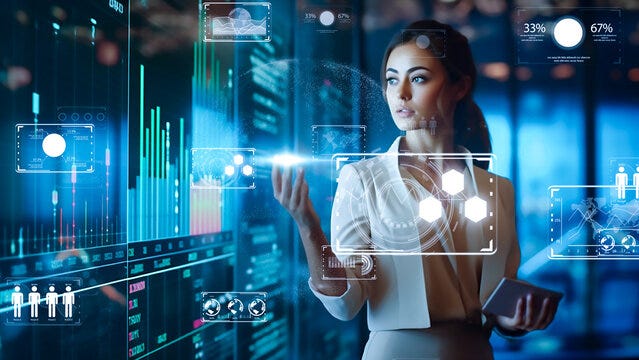
Technology is evolving at a rapid pace, transforming industries and reshaping the way we live and work. From artificial intelligence to quantum computing, emerging trends are driving innovation and offering exciting possibilities. Here are some of the key technology trends in 2025 that are making a significant impact:
1. Artificial Intelligence and Machine Learning
AI continues to revolutionize industries with its capabilities in automation, predictive analytics, and personalization. Generative AI models like ChatGPT and AI-driven assistants are becoming more advanced, assisting businesses in content creation, customer support, and software development. Machine learning algorithms are also enhancing cybersecurity, healthcare diagnostics, and financial forecasting.
2. Quantum Computing
Quantum computing is advancing rapidly, with tech giants like Google, IBM, and Microsoft making breakthroughs in quantum processors. These powerful computers have the potential to solve complex problems in minutes that would take classical computers years. Industries such as cryptography, drug discovery, and climate modeling are expected to benefit significantly from this technology.
3. 5G and Beyond
5G networks are expanding globally, offering faster internet speeds and lower latency. This advancement is enabling real-time communication for IoT devices, smart cities, and autonomous vehicles. Researchers are already working on 6G, which promises even more impressive capabilities, including ultra-fast data transmission and AI-powered network optimization.
4. Blockchain and Decentralized Finance (DeFi)
Blockchain technology is evolving beyond cryptocurrencies, playing a vital role in supply chain management, secure transactions, and digital identity verification. Decentralized finance (DeFi) platforms are disrupting traditional banking, offering peer-to-peer lending, smart contracts, and secure transactions without intermediaries.
5. Extended Reality (XR): AR, VR, and MR
Augmented Reality (AR), Virtual Reality (VR), and Mixed Reality (MR) are transforming various sectors, including gaming, education, healthcare, and real estate. The metaverse is gaining traction, with companies investing heavily in creating immersive digital environments for work, social interaction, and entertainment.
6. Cybersecurity and Zero Trust Architecture
As cyber threats become more sophisticated, organizations are adopting Zero Trust Architecture, where no entity is automatically trusted within a network. AI-driven security solutions, multi-factor authentication, and biometric verification are becoming standard practices to protect sensitive data.
7. Edge Computing and IoT Expansion
With the proliferation of IoT devices, edge computing is gaining momentum, allowing data processing to occur closer to the source rather than relying on centralized cloud servers. This reduces latency and enhances real-time decision-making, making it crucial for industries such as healthcare, manufacturing, and smart cities.
8. Sustainable Tech and Green Computing
As climate change concerns grow, companies are investing in green technologies to reduce their carbon footprint. Energy-efficient data centers, AI-driven energy optimization, and sustainable materials in electronics manufacturing are emerging as key trends in 2025.
9. Human-AI Collaboration
Rather than replacing jobs, AI is increasingly seen as a collaborative tool that enhances human productivity. AI-powered copilots for coding, content generation, and decision-making are streamlining workflows, allowing professionals to focus on higher-level tasks.
10. Biotech and Personalized Medicine
Advancements in biotechnology, including gene editing and personalized medicine, are transforming healthcare. AI-driven diagnostics, wearable health tech, and digital twins of human organs are revolutionizing how diseases are diagnosed and treated.
Final Thoughts
The rapid advancement of technology is reshaping industries and opening up new possibilities. Businesses and individuals who stay updated with these trends will be better positioned to leverage innovation and remain competitive in the digital age. The future promises exciting developments, and embracing these changes will be key to thriving in the tech-driven world of tomorrow.